Indian variant is becoming more common in the UKpublished at 17:13 BST 19 May 2021
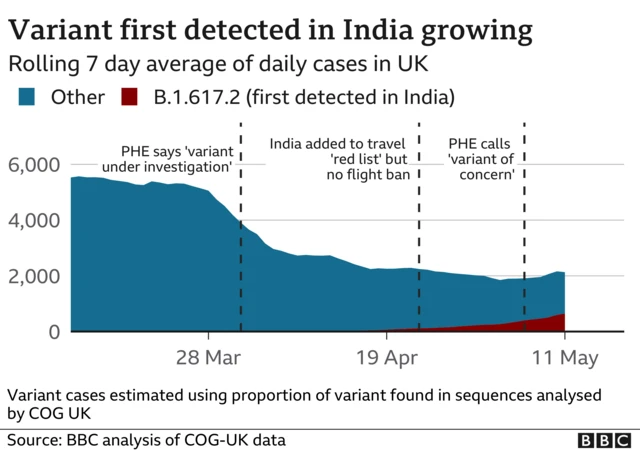
Health Secretary Matt Hancock is giving an update on the Indian variant of coronavirus in the UK as cases rise to almost 3,000.
Health Secretary Matt Hancock says it is "so important" for vulnerable people to have their second jab as UK Indian variant cases rise to almost 3,000
Surge testing is increasing in Bedford, Burnley, Leicester, Kirklees, North Tyneside and Hounslow, he tells a No 10 briefing
Thousands of volunteers are to receive a booster vaccination in a clinical trial launching today, Hancock announces
Seven out of 10 adults have now had their first dose of a vaccine and almost four in 10 have had two doses, Hancock says
Almost 1.5bn vaccine doses have now been given across the world and 400m of those have been the Oxford AstraZeneca vaccine, he says
Labour leader Sir Keir Starmer urges the PM to scrap the travel traffic light system, saying it has "confused" messaging
Boris Johnson has warned people should not be holidaying in amber list countries, after a minister said people could visit friends
EU ambassadors have backed proposals to reopen borders for non-essential travel from countries with low infection rates
A decision on whether to add the UK and other countries to the EU's "safe list" will be made on Friday
India has recorded one of the highest ever number of daily coronavirus deaths in the world, at 4,529

Health Secretary Matt Hancock is giving an update on the Indian variant of coronavirus in the UK as cases rise to almost 3,000.
Health Secretary Matt Hancock begins by saying that overall hospital admissions and deaths remain "very low".
He says the government has been able to take away more restrictions this week.
But the government must proceed with "vigilance" and with "everyone taking personal responsibility", he says.
Hancock says it was always known that one thing that could knock the UK off track was a new variant.
He says the early evidence suggests the Indian variant passes on more easily from person to person than the Kent variant.
But he says there is "increasing confidence" that the vaccines are effective against it.
The Downing Street coronavirus briefing is now under way.
Health Secretary Matt Hancock is to announce that thousands of volunteers will receive a booster vaccine in a clinical trial launching today.
In a statement issued ahead of the briefing, the Department of Health said the Cov-Boost study, led by University Hospital Southampton NHS Foundation Trust, will trial seven vaccines and will be the first in the world to provide data on the impact of a third dose on patients’ immune responses.
The initial findings, expected in September, will help inform decisions by the Joint Committee on Vaccination and Immunisation on plans for a booster programme from autumn this year.
Vaccines being trialled include Oxford-AstraZeneca, Pfizer-BioNTech, Moderna, Novavax, Valneva, Janssen and Curevac, as well as a control group.
You can read more here.
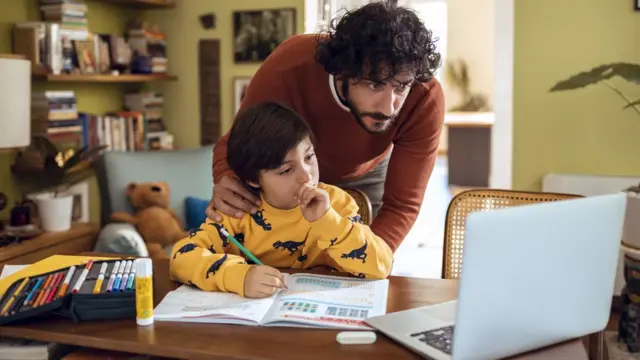 Image source, Getty Images
Image source, Getty ImagesParents' evenings are likely to remain virtual beyond the pandemic, the government's education catch-up tsar has said.
Video calls were "much better than trying to find a car-parking space on a wet Tuesday and waiting your turn," Sir Kevan Collins told the Lord’s Youth Unemployment Committee.
The National Association of Head Teachers said it hoped to see a hybrid model for such events in the future.
General secretary Paul Whiteman says while video calls make the meetings easier for some, it could be more difficult for others.
Some conversations were better face to face and “may be the only time in the year that parents and carers actually step inside their child’s school or classroom and see their work”, he says.
In the next 15 minutes Health Secretary Matt Hancock will lead a Downing Street coronavirus briefing.
It comes after Boris Johnson said there was "increasing confidence" that Covid-19 vaccines were effective against all variants, including the Indian one.
At Prime Minister's Questions, he said fresh data had been reviewed earlier on Wednesday.
He also thanked people in Indian variant hotspots Bolton and Blackburn for getting a jab "in record numbers". You can read more here.
We will be bringing you updates from the briefing.
Health Secretary Matt Hancock will lead a press briefing from Downing Street in the next half hour.
He is expected to give an update on the Indian variant of coronavirus after the number of detected cases in the UK rose to 2,967.
Hancock earlier announced surge testing in Hounslow, Leicester and North Tyneside.
Stay with us for all the updates from the briefing as well as analysis from our experts.
The UK has given a total of 57,855,958 coronavirus vaccinations, according to the daily figures released by the government., external
That's 36,985,505 first doses and 20,870,453 second doses.
There have been a further three coronavirus-related deaths in the UK, according to the government's daily figures., external
That brings the total number of people to die within 28 days of a positive Covid-19 test to 127,694.
A further 2,696 new infections were also recorded.
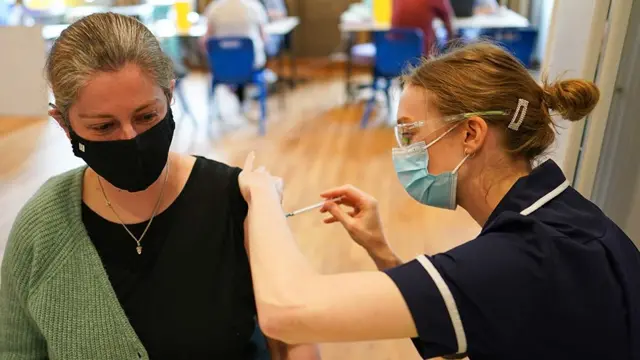 Image source, Getty Images
Image source, Getty ImagesConcerns over the Indian variant mean vaccination is being speeded up in many areas and second doses are being offered earlier to some people.
Anyone in the UK who has been invited for a vaccine but has not yet come forward, is urged to do so quickly.
Find out when you will get the vaccine here.
London mayor Sadiq Khan says he is asking the government to roll out the coronavirus vaccine more quickly for under-36s in areas where there is concern about the Indian variant.
Speaking at an electric bus factory in North Yorkshire, Khan says: "We're going to have new variants but what we can't do is allow them to spread too fast because of a delay in the rollout of the vaccine.
"I'm hoping the government is nimble and flexible, and allows in those parts of the country, from Bolton, to Blackburn, to Bradford, to boroughs in London, where we are concerned about the Indian variant, for the vaccine to be rolled out quicker for younger people."
Khan says he is concerned about the retail, hospitality, leisure, tourism and culture sectors if restrictions are not lifted on 21 June.
He said: "I worry about jobs being lost and that's why I'm asking the government to not risk the chance of us not reopening on 21 June by being rigid when it comes to the vaccine rollout."

 Nick Triggle
Nick Triggle
Health Correspondent
There is growing confidence the vaccines will remain effective against the variants that are emerging.
Lab work which uses blood from vaccinated people to see how well the antibodies generated by the jab block the virus from infecting cells shows some drop-off in potency for the key variants – and this is what has caused such concern in recent months.
The biggest drop off by far is for the South African variant with early reports suggesting the Indian variant only weakens the vaccine effect a little more than the UK variant does.
But lab work only takes you so far. Emerging real world evidence is what is giving scientists the most hope.
We know from the rollout of the vaccination programme here that vaccines remain highly effective against that UK variant. Studies in India where AstraZeneca has been used are also encouraging – although they are yet to be formally published.
But perhaps the most promising is data collected in Qatar where the South African variant has spread.
It suggested the Pfizer vaccine’s ability to stop serious illness remain intact and there was only a relatively small loss in its ability to block mild infections.
In the fight between vaccines and variants, it’s the vaccines that are winning.
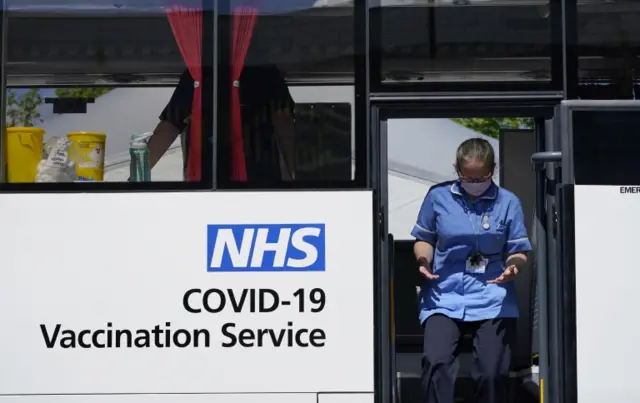 Image source, PA Media
Image source, PA MediaSurge testing has already been taking place in Bolton
Health Secretary Matt Hancock has announced that surge testing will take place in more areas including Bedford, Burnley, Hounslow, Kirklees, Leicester and North Tyneside - amid concern about the Indian variant.
He tells MPs they are supporting the Scottish Government "who are taking similar action in Glasgow and Moray".
"In the last week across Bolton and Blackburn with Darwen we have given 26,094 jabs as well as delivering 75,000 extra tests," Mr Hancock says.
"But this challenge is not restricted to Bolton and Blackburn. We have used the extensive bio-security surveillance system that we have built and new techniques to identify the areas we are most concerned about where we will now surge testing and vaccinations further."
Mr Hancock says more vaccinations will be made available in those for everyone who is eligible - in England those aged 36 and over are invited to get their jab.
He confirms that 2,967 cases of the B1617.2 variant, first discovered in India, have now been identified.
Vinnie O'Dowd
BBC News
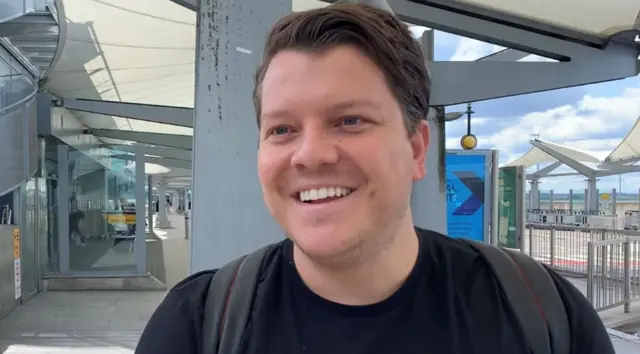
Paul Cutter says it is worth quarantine and tests on return for the trip away
Malaga, Lisbon, Mexico City. Just some of the destinations that holiday makers were heading off to today - from Heathrow Terminal 5.
The BBC overheard some well wishes "have a great time", but many tight-lipped travellers chose not to confirm to the BBC that a holiday was on the cards.
One told the BBC that they would deal with the post-holiday restrictions when they returned home from their week away in Mexico, a country on the UK government's "amber" list. Travellers returning from these destinations have to quarantine for 10 days and take Covid tests.
Paul Cutter says that a returning quarantine is "a necessary evil".
"It's important we do all the necessary tests and stay at home and do what we got to do, but it's worth it to get away and have a nice time," he says.
British citizen Awoala Kpunpamo, 34, was taking no chances.
He arrived four days ahead of his planned business trip to Nigeria to get his PCR test.
However, he was told to come back tomorrow as the PCR test needed to be done within 72 hours of travel.
"I dont want to leave anything to chance, this trip is very important to me. But I came too early to do my PCR test. I will return tomorrow and get it done," he says.
The desire for more space after lockdown and pandemic tax breaks have helped push up house prices, which have soared by 10.2% in the year to March - the highest annual growth rate for 14 years.
The Office for National Statistics said average prices rose by £24,000 to £256,000 - a new record high.
Tax breaks introduced during the pandemic to boost the housing market had a marked effect over the period.
The ONS report said: "Changes in the tax paid on housing transactions may have allowed sellers to request higher prices as the buyers' overall costs are reduced."
Prices have also been pushed up by the temporary stamp duty reduction and low interest rates.
A stamp duty holiday in England and Northern Ireland, which had been due to end in March, was recently extended.
In Wales, a holiday on the equivalent tax has also been extended until the end of June 2021.
A similar property transaction tax in Scotland ended on 31 March 2021.
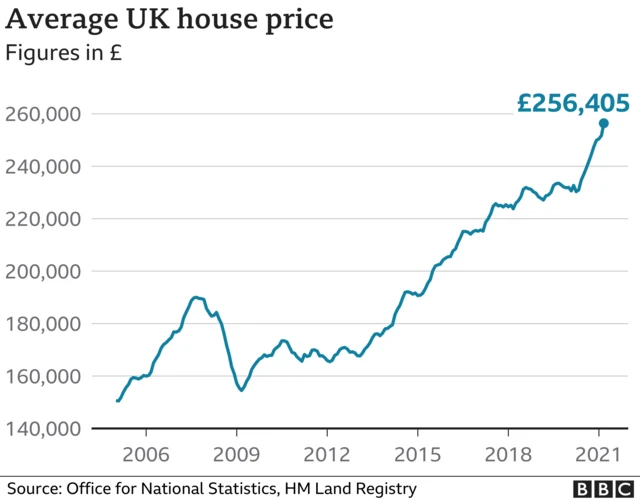
A tribe of goats which wandered onto the streets of Llandudno in north Wales during the quiet days of lockdown are being relocated.
There are safety fears for the animals, as well as for passing vehicles and the gardens they like to chow down on.
The goats are initially being taken to farmland beyond the Great Orme mountain where they usually live, to re-acquaint them with their usual habitat, and then they will be released.
 Rhoda Odhiambo
Rhoda Odhiambo
BBC News, Lilongwe
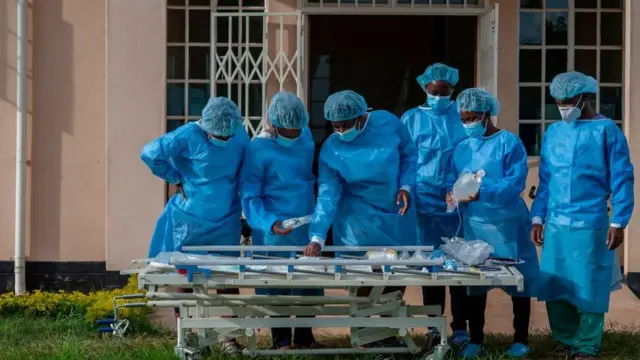 Image source, Getty Images
Image source, Getty ImagesHealth officials hope the event will increase public confidence in the vaccine
Health authorities in Malawi have incinerated 19,610 expired doses of the AstraZeneca coronavirus vaccine, saying it will reassure the public that any vaccines they do get are safe.
It is the first African country to publicly do this.
The World Health Organization initially urged countries not to destroy expired doses but has now changed its advice.
Uptake of the vaccine in Malawi has been low and health workers hope the move will increase public confidence.
Out of a population of about 18 million people, the country has recorded 34,232 confirmed coronavirus cases and 1,153 deaths.
 Image source, Getty Images
Image source, Getty ImagesA member of Iceland's entrant in the 2021 Eurovision Song Contest has tested positive for coronavirus.
Daði og Gagnamagnið will remain in the competition, but won't perform in today's rehearsal or tomorrow's live semi-final show.
Lead singer Daði Freyr broke the news on Twitter on Wednesday.
"We have all been extremely careful the whole trip so this comes as a huge surprise," he writes.
Instead of a live performance, a recording from a previous rehearsal will be used.
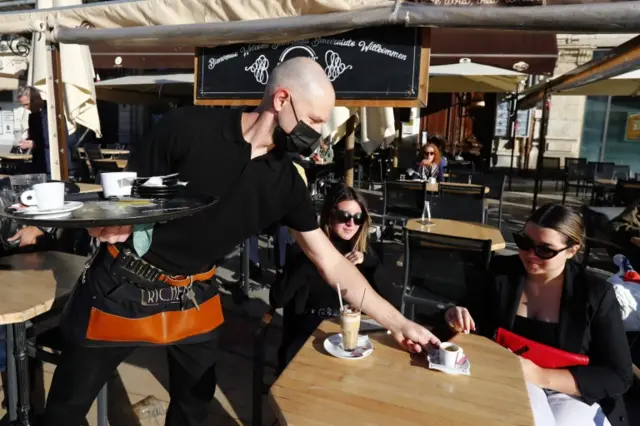 Image source, EPA
Image source, EPAFrance is easing its restrictions, allowing cafe customers to be served outdoors
Here’s your afternoon round-up of today’s main coronavirus stories so far:
 BBC Radio 5 Live
BBC Radio 5 Live
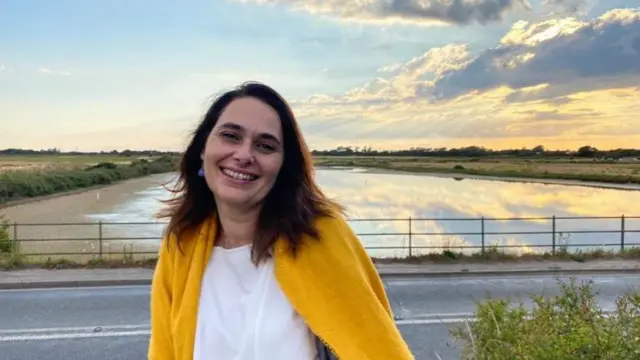
Today, 5 Live has been hearing from people facing the dilemma of whether or not to travel abroad this summer.
Valérie (pictured), in York, says she is conflicted over whether she should visit her terminally ill father in France later this year.
Originally from France herself, Valérie has a house near her father’s and travels there by ferry. She says she last visited in January when her mum died.
"With this India variant, I don’t know whether France will allow people from the UK to travel there," she says.
"Time isn’t on my side. I don’t want to go too last minute.
"He isn’t well, he isn’t coping well, he is just looking forward to the summer.
"It is just quite stressful."
Rob in Hertfordshire tells us about his family holiday to Greece which was originally planned for October 2020.
He explains that when foreign travel was banned last year, the travel company rescheduled his family’s trip to the upcoming May half term.
He says he still plans to go to Greece despite it being on the government’s amber list of countries.
"The travel company won’t move it again, so we are going because I can’t afford to write off a holiday," he says.
"My insurance won’t pay anything because I can go. If the government don’t want me to travel, they need to change the guidance to ‘all but essential travel’, at which point the insurance pays me my money or I can move it again."
Rob adds that he will lose £3,500 if he cancels the holiday himself, so he still wants to take his children to Greece with him, meaning they could miss school on their return if they need to quarantine.
He said: "The children will stay at home. If they miss a week of school, they miss a week of school."
We reported earlier that Health Secretary Matt Hancock will lead a Downing Street press conference at about 17:00 BST.
He will be joined by deputy chief medical officer Professor Jonathan Van-Tam and the UK Health Security Agency's Dr Jenny Harries.